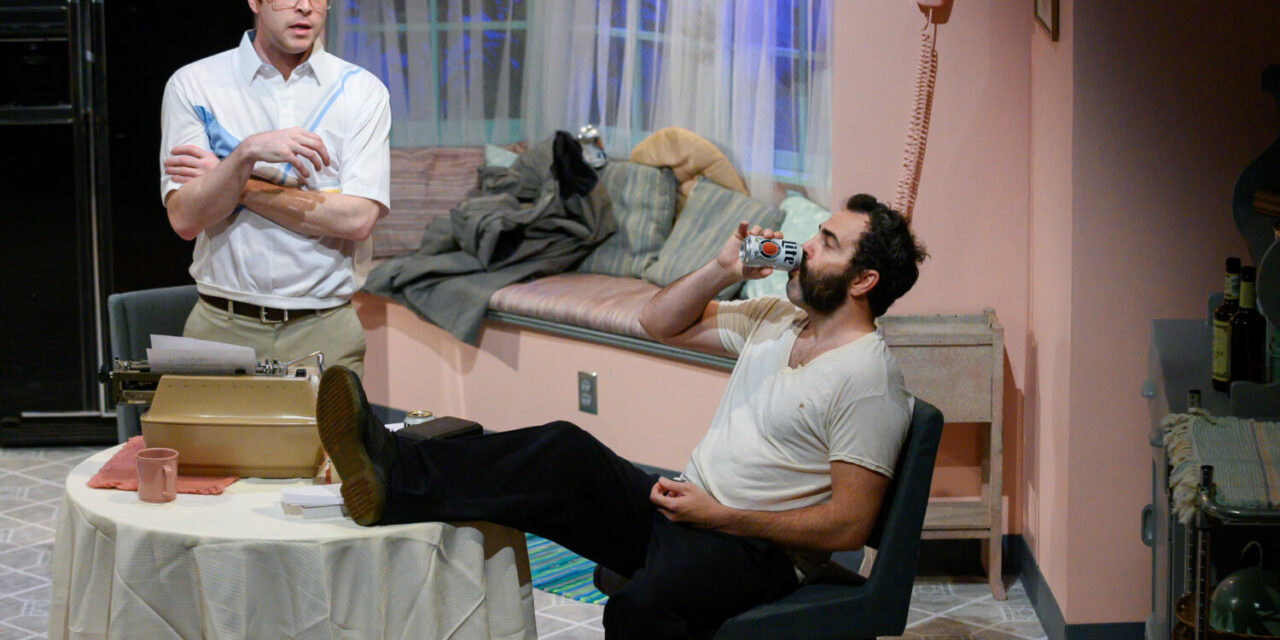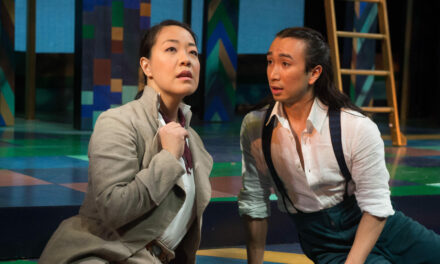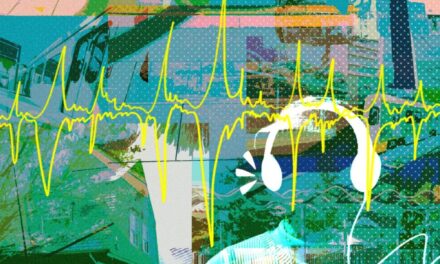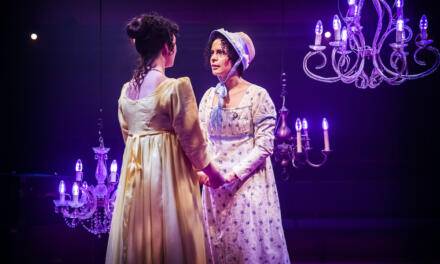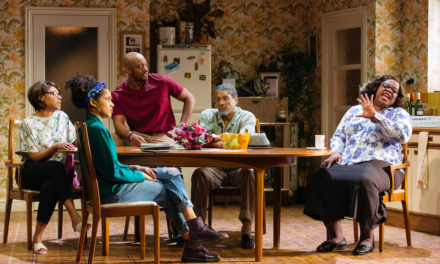Some theater thrills because it resonates with the Zeitgeist; some thrills because the performances are so juicy and riveting you’re just jazzed to be on the ride.
The barebones production of Sam Shepard’s classic True West falls into that latter category. I’m not sure what the play itself has to say about our present moment – although the role of Lee, as a character study in alpha-male narcissism, invites comparisons to a certain leader-who-shall-not-be-named – but the production is a glorious tour de force for its two main actors, Patrick Jordan and Gabriel King.
True West depicts a battle between two brothers: Lee (Jordan), the elder, is an itinerant and mentally unstable alcoholic who burgles houses for a living; Austin (King), the younger, is a milquetoasty conformist with a wife and kids, a house in the Northern California suburbs, and a budding career as a screenwriter. The conflict has already been set in motion when the play begins: Lee has dropped in unexpectedly on Austin, who is working on a career-defining spec script while housesitting for their vacationing mother at her home near Los Angeles. Lee’s resentment of his younger brother’s Ivy-league education and apparently successful career is palpable and menacing; Austin, in turn, is warily treading on eggshells in response to his volatile older brother’s unpredictability. The main conflict in the play comes when Lee manages (via a gamble on the golf course) to sell a screenplay idea to Saul (Randy Kovitz), the Hollywood producer who has been working with Austin on his film project; Lee’s unexpected success – and Saul’s insistence that Austin drop his own project and write Lee’s movie instead – leads to the unraveling of a whole new set of resentments and insecurities and to the chaotic destruction of the interior of their mother’s home.
As a writer, Shepard made a career out of depicting the yearnings and disappointments and deep rages of a certain class and type of American male; as an actor and director, this has been Jordan’s subject of interest, too, and he seems to have been born to play the role of Lee. In Jordan’s hands, Lee’s unkemptness and lack of boundaries seem, at times, studied and deliberate – even his muttonchop of a beard hints that this is a man who crafts his menace. Jordan’s interpretation of the role perceptively captures a truth about narcissism and other personality disorders: it’s never clear whether his Lee is truly out of control or only appearing to be so as a means of manipulating others by keeping them off balance. In other words, his Lee is either crazy, or crazy like a fox (now who else have we heard that said about?), and his charismatic effect on others – Austin, in particular, but also Saul, and, in the plays’ final moments, their mother (Heidi Mueller Smith), is both bewildering and unpredictable.
In many ways, King has the tougher challenge with the character Austin, whose journey in the play is more of a reach: by play’s end, Austin has realized the emptiness of his existence and decided to test his own skills living in the desert as his brother has been doing. King skillfully builds the groundwork for that transformation by keeping their past relationship present in the action: we see little hints, throughout, that Austin once practically worshipped Lee and saw him as the kind of free-spirited rebel he couldn’t bring himself to be. Alcohol unleashes Austin’s inner Lee, and King plays the reversal in roles between the two men with hilarious and frightening abandon.

L to R: Gabriel King and Patrick Jordan. Photo by Jeff Swensen. Courtesy of barebones productions.
Under Jordan’s direction, the production leans into the play’s excess to brilliant comic effect. Both Jordan and King revel in the play’s unleashing of testosterone and its descent into Bacchanalian physical abandon: much beer is drunk, sprayed, spilled, and splashed, both a typewriter and a golf club are violently destroyed, cabinets and drawers full of kitchen supplies are flung heedlessly to the floor, and obscene amounts of toast are consumed (Tony Ferrieri’s detail-rich 1970s kitchen takes a lot of abuse in this play). At the same time, the production also dives deeply and intelligently into the play’s complicated psychological and family dynamics. At one point in the play, Lee describes a chase scene in the movie he wants to write: “The one who’s chasin’ doesn’t know where the other one is taking him. And the one who’s being chased doesn’t know where he’s going.” That’s also an apt description for the relationship between the two brothers, each of whom is chasing after something in the other’s life, and neither of whom has any real idea of where they are going. In this acute and perceptive production, Jordan and King limn that dynamic masterfully, giving two of the best performances you’ll see on stage this year.
This article was originally posted in The Pittsburgh Tatler on 11 September 2019 and has been reposted with permission.
This post was written by the author in their personal capacity.The opinions expressed in this article are the author’s own and do not reflect the view of The Theatre Times, their staff or collaborators.
This post was written by Wendy Arons.
The views expressed here belong to the author and do not necessarily reflect our views and opinions.

